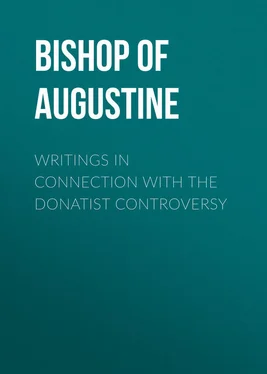Saint Augustine - Writings in Connection with the Donatist Controversy
Здесь есть возможность читать онлайн «Saint Augustine - Writings in Connection with the Donatist Controversy» — ознакомительный отрывок электронной книги совершенно бесплатно, а после прочтения отрывка купить полную версию. В некоторых случаях можно слушать аудио, скачать через торрент в формате fb2 и присутствует краткое содержание. Жанр: foreign_antique, foreign_prose, на английском языке. Описание произведения, (предисловие) а так же отзывы посетителей доступны на портале библиотеки ЛибКат.
- Название:Writings in Connection with the Donatist Controversy
- Автор:
- Жанр:
- Год:неизвестен
- ISBN:нет данных
- Рейтинг книги:3 / 5. Голосов: 1
-
Избранное:Добавить в избранное
- Отзывы:
-
Ваша оценка:
- 60
- 1
- 2
- 3
- 4
- 5
Writings in Connection with the Donatist Controversy: краткое содержание, описание и аннотация
Предлагаем к чтению аннотацию, описание, краткое содержание или предисловие (зависит от того, что написал сам автор книги «Writings in Connection with the Donatist Controversy»). Если вы не нашли необходимую информацию о книге — напишите в комментариях, мы постараемся отыскать её.
Writings in Connection with the Donatist Controversy — читать онлайн ознакомительный отрывок
Ниже представлен текст книги, разбитый по страницам. Система сохранения места последней прочитанной страницы, позволяет с удобством читать онлайн бесплатно книгу «Writings in Connection with the Donatist Controversy», без необходимости каждый раз заново искать на чём Вы остановились. Поставьте закладку, и сможете в любой момент перейти на страницу, на которой закончили чтение.
Интервал:
Закладка:
Chap. xxi. – 28. With regard to the objection brought against Cyprian, that the catechumens who were seized in martyrdom, and slain for Christ's name's sake, received a crown even without baptism, I do not quite see what it has to do with the matter, unless, indeed, they urged that heretics could much more be admitted with baptism to Christ's kingdom, to which catechumens were admitted without it, since He Himself has said, "Except a man be born of water and of the Spirit, he cannot enter into the kingdom of God." 289 289 John iii. 5.
Now, in this matter I do not hesitate for a moment to place the Catholic catechumen, who is burning with love for God, before the baptized heretic; nor yet do we thereby do dishonour to the sacrament of baptism which the latter has already received, the former not as yet; nor do we consider that the sacrament of the catechumen 290 290 Another reading, of less authority, is, "Aut catechumeno sacramentum baptismi præferendum putamus." This does not suit the sense of the passage, and probably sprung from want of knowledge of the meaning of the "catechumen's sacrament." It is mentioned in the third Council of Carthage as "the sacrament of salt" (Conc. Carth. 3, can. 5). Augustine ( de Peccat. Meritis , ii. c. 26) says that "what the catechumens receive, though it be not the body of Christ, yet is holy, more holy than the food whereby our bodies are sustained, because it is a sacrament." – Cp. de Catech. Rudibus , c. 26. It appears to have been only a taste of salt, given them as the emblem of purity and incorruption. See Bingham, Orig. Eccles. Book x. c. ii. 16.
is to be preferred to the sacrament of baptism, when we acknowledge that some catechumens are better and more faithful than some baptized persons. For the centurion Cornelius, before baptism, was better than Simon, who had been baptized. For Cornelius, even before his baptism, was filled with the Holy Spirit; 291 291 Acts x. 44.
Simon, even after baptism, was puffed up with an unclean spirit. 292 292 Acts viii. 13, 18, 19.
Cornelius, however, would have been convicted of contempt for so holy a sacrament, if, even after he had received the Holy Ghost, he had refused to be baptized. But when he was baptized, he received in no wise a better sacrament than Simon; but the different merits of the men were made manifest under the equal holiness of the same sacrament, – so true is it that the good or ill deserving of the recipient does not increase or diminish the holiness of baptism. But as baptism is wanting to a good catechumen to his receiving the kingdom of heaven, so true conversion is wanting to a bad man though baptized. For He who said, "Except a man be born of water and of the Spirit, he cannot enter into the kingdom of God," said also Himself, "Except your righteousness shall exceed the righteousness of the scribes and Pharisees, ye shall in no case enter into the kingdom of heaven." 293 293 Matt. v. 20.
For that the righteousness of the catechumens might not feel secure, it is written, "Except a man be born again of water and of the Spirit, he cannot enter into the kingdom of God." And again, that the unrighteousness of the baptized might not feel secure because they had received baptism, it is written, "Except your righteousness shall exceed the righteousness of the scribes and Pharisees, ye shall in no case enter into the kingdom of heaven." The one were too little without the other; the two make perfect the heir of that inheritance. As, then, we ought not to depreciate a man's righteousness, which begins to exist before he is joined to the Church, as the righteousness of Cornelius began to exist before he was in the body of Christian men, – which righteousness was not thought worthless, or the angel would not have said to him, "Thy prayers and thine alms are come up as a memorial before God;" nor did it yet suffice for his obtaining the kingdom of heaven, or he would not have been told to send to Peter, 294 294 Acts x. 4, 5.
– so neither ought we to depreciate the sacrament of baptism, even though it has been received outside the Church. But since it is of no avail for salvation unless he who has baptism indeed in full perfection be incorporated into the Church, correcting also his own depravity, let us therefore correct the error of the heretics, that we may recognise what in them is not their own but Christ's.
Chap. xxii. – 29. That the place of baptism is sometimes supplied by martyrdom is supported by an argument by no means trivial, which the blessed Cyprian adduces 295 295 Cypr. Ep. lxxiii. sec. 19.
from the thief, to whom, though he was not baptized, it was yet said, "To-day shalt thou be with me in paradise." 296 296 Luke xxiii. 43.
On considering which again and again, I find that not only martyrdom for the sake of Christ may supply what was wanting of baptism, but also faith and conversion of heart, if recourse may not be had to the celebration of the mystery of baptism for want of time. 297 297 In Retract. ii. 18, Augustine expresses a doubt whether the thief may not have been baptized.
For neither was that thief crucified for the name of Christ, but as the reward of his own deeds; nor did he suffer because he believed, but he believed while suffering. It was shown, therefore, in the case of that thief, how great is the power, even without the visible sacrament of baptism, of what the apostle says, "With the heart man believes unto righteousness, and with the mouth confession is made unto salvation." 298 298 Rom. x. 10.
But the want is supplied invisibly only when the administration of baptism is prevented, not by contempt for religion, but by the necessity of the moment. For much more in the case of Cornelius and his friends, than in the case of that robber, might it seem superfluous that they should also be baptized with water, seeing that in them the gift of the Holy Spirit, which, according to the testimony of holy Scripture, was received by other men only after baptism, had made itself manifest by every unmistakeable sign appropriate to those times when they spoke with tongues. Yet they were baptized, and for this action we have the authority of an apostle as the warrant. So far ought all of us to be from being induced by any perfection in the inner man, if it so happen that before baptism a person has advanced, through the workings of a pious heart, to spiritual understanding, to despise a sacrament which is applied to the body by the hands of the minister, but which is God's own means for working spiritually a man's dedication to Himself. Nor do I conceive that the function of baptizing was assigned to John, so that it should be called John's baptism, for any other reason except that the Lord Himself, who had appointed it, in not disdaining to receive the baptism of His servant, 299 299 Matt. iii 6, 13.
might consecrate the path of humility, and show most plainly by such an action how high a value was to be placed on His own baptism, with which He Himself was afterwards to baptize. For He saw, like an excellent physician of eternal salvation, that overweening pride would be found in some, who, having made such progress in the understanding of the truth and in uprightness of character that they would not hesitate to place themselves, both in life and knowledge, above many that were baptized, would think it was unnecessary for them to be baptized, since they felt that they had attained a frame of mind to which many that were baptized were still only endeavouring to raise themselves.
Chap. xxiii. – 30. But what is the precise value of the sanctification of the sacrament (which that thief did not receive, not from any want of will on his part, but because it was unavoidably omitted), and what is the effect on a man of its material application, it is not easy to say. Still, had it not been of the greatest value, the Lord would not have received the baptism of a servant. But since we must look at it in itself without entering upon the question of the salvation of the recipient, which it is intended to work, it shows clearly enough that both in the bad, and in those who renounce the world in word and not in deed, it is itself complete, though they cannot receive salvation unless they amend their lives. But as in the thief, to whom the material administration of the sacrament was necessarily wanting, the salvation was complete, because it was spiritually present through his piety, so, when the sacrament itself is present, salvation is complete, if what the thief possessed be unavoidably wanting. And this is the firm tradition of the universal Church, in respect of the baptism of infants, who certainly are as yet unable "with the heart to believe unto righteousness, and with the mouth to make confession unto salvation," as the thief could do; nay, who even, by crying and moaning when the mystery is performed upon them, raise their voices in opposition to the mysterious words, and yet no Christian will say that they are baptized to no purpose.
Читать дальшеИнтервал:
Закладка:
Похожие книги на «Writings in Connection with the Donatist Controversy»
Представляем Вашему вниманию похожие книги на «Writings in Connection with the Donatist Controversy» списком для выбора. Мы отобрали схожую по названию и смыслу литературу в надежде предоставить читателям больше вариантов отыскать новые, интересные, ещё непрочитанные произведения.
Обсуждение, отзывы о книге «Writings in Connection with the Donatist Controversy» и просто собственные мнения читателей. Оставьте ваши комментарии, напишите, что Вы думаете о произведении, его смысле или главных героях. Укажите что конкретно понравилось, а что нет, и почему Вы так считаете.












